WHO's $Moneypox narrative today: Not a single death yet outside Congo
I told you, if you want to make up deaths, Congo is probably the easiest place in the world to get away with it. WHO is giving out TPOXX though NIH says it does not work against Congo's moneypox
https://www.who.int/emergencies/disease-outbreak-news/item/2024-DON528
A nothingburger disease must get a super expensive drug and vaccines, because because because because because….
We here in the west get to find out how they work, get to replenish our stockpiles, etc.
Described below are the latest countries in the African region newly affected by mpox, either clade I or clade II, since the start of the multi-country outbreak in 2022. Additional countries in the region are continuing to report cases, please refer to the latest situation report published for an update on these countries including the latest epidemiological trends.
Central and East Africa
Burundi
On 25 July 2024, the Ministry of Health of Burundi declared an outbreak of mpox following the confirmation of three cases by the National Reference Laboratory of the National Institute of Public Health. These cases were identified on 22 July; one case from Kamenge University Hospital, a second case from Kamenge Military Hospital, and the third case from Isare Health District. They reported symptom onset on 24 July including fever, joint pain, and a widespread rash. Samples collected during a multidisciplinary investigation tested positive for mpox on 25 July with PCR. These are the first confirmed mpox cases ever identified in Burundi.
As of 17 August 2024, there had been 545 alerts of mpox cases since the outbreak declaration, of which 474 suspected cases (86.9%) had been investigated and validated. Of 358 suspected cases tested, 142 (39.7%) tested positive for MPXV. Genomic sequencing analysis has confirmed clade Ib MPXV. No deaths were reported as of 17 August.
Confirmed cases have been reported from 26 of the 49 districts (53.1%). The most affected district is Bujumbura Nord, an urban area, with 54 of the 142 confirmed cases (38%). No deaths had been documented at the time of reporting.
Males account for 55.6% of the cases and females for 44.4%. Children under the age of five years make up 60.3% of the cases, followed by those aged from 11 to 20 years (42.6%), and those aged from 21 to 30 years (38.2%). [Note that if you add these numbers together, people under the age of 31 make up 141.1% of total cases. In other words, these are bogus numbers or grossly in error.—Nass]
Kenya
On 29 July 2024, the Ministry of Health confirmed a case of mpox in Taita Taveta County bordering Tanzania. The patient is a 42-year-old Kenyan male residing in Kiambu County (neighbouring Nairobi). The case has a history of travel from Kampala, Uganda, to Mombasa, Kenya, and at the time of identification, the patient was travelling to Rwanda through Tanzania.
As of 13 August, a total of 14 suspected cases had been identified, one case had tested positive for MPXV Clade Ib,12 suspected cases had tested negative, and the test result for one case was pending. This is the first mpox case ever identified in Kenya. No deaths had been reported as of 13 August.
Rwanda
On 24 July 2024, IHR National Focal Point (NFP) for Rwanda notified WHO of two laboratory-confirmed mpox cases in Rwanda, and on 27 July, the Ministry of Health declared an outbreak of mpox in the country. The cases included a 33-year-old female (case 1) who frequently travels to the Democratic Republic of the Congo, and a 34-year-old male (case 2) with a recent travel history to the Democratic Republic of the Congo. Case 1 was identified at a point of entry (PoE) and isolated in Rusizi district, and case 2 was identified at Kibagabaga hospital of Gasabo district. Both cases were reported to be in stable condition and under continuous medical follow-up. These are the first confirmed mpox cases ever identified in Rwanda.
As of 7 August 2024, four confirmed mpox cases and zero deaths had cumulatively been reported by the country. Among the two new cases, one is a 34-year-old male, residing in Gasabo District in Kigali. His symptoms started on 15 July 2024 with fever, swollen lymph nodes, sore throat, and rashes on the arms, face and genitals. He had travelled back from Burundi on 12 July 2024 and is currently in isolation. Five close contacts are under follow up. The other case is a 39-year-old Rwandan male, resident of Kicukiro District with travel history to the Democratic Republic of the Congo. He had similar symptoms, along with headache, which started on 12 July 2024. Four of his close contacts have been identified and they are under follow up. Sequencing analysis has confirmed MPXV Clade Ib.
Uganda
In June and early July 2024, Kasese District enhanced surveillance for mpox disease along the border with the Democratic Republic of the Congo in light of reported increasing cases in the neighbouring country. Following the orientation of screeners at the Bwera point of entry and Bwera Hospital, six suspected cases were identified on 11 July. Samples were collected for laboratory testing from the suspected cases, two of which tested positive for MPXV Clade Ib on 15 July. The first of the confirmed cases is a 37-year-old female and the second case is a 22-year-old female national of the Democratic Republic of the Congo. These are the first mpox cases identified in the country. Both cases had onset of symptoms on 11 July and were confirmed by a PCR test at the Uganda Virus Research Institute on 15 July 2024.
Investigations revealed that transmission occurred outside Uganda and no secondary transmission has been linked to the two cases as of 12 August 2024. By the same date, 39 suspected cases had been reported. Furthermore, 37 contacts of the confirmed cases were under follow-up. No deaths have been reported as of 20 August.
West Africa
Côte d’Ivoire
In July 2024, Côte d’Ivoire confirmed two non-fatal cases of mpox. The first case is a 46-year-old patient who consulted a doctor on 1 July with a fever, headache and skin rash, in Tabou district, San Pedro region, on the border with Liberia. Mpox was confirmed by the Institut Pasteur de Côte d'Ivoire laboratory on 3 July and again on 14 July by the Institute Pasteur in Dakar. The second case is a 20-year-old patient, in the Koumassi health district in Abidjan, who presented with skin rash and oral mucosal lesions on 14 July. No epidemiological link between these first two cases has been identified.
As of 7 August 2024, seven mpox cases had been confirmed in three health districts: Koumassi (one case), Tabou (one case), and Yopougon-Ouest-Songon (five cases). Four of the confirmed cases (57%) are male, and all seven cases are above 15 years of age. Forty contacts have been identified and are being followed up. The country has previously reported mpox, but no cases had been notified since the start of the multi-country outbreak in 2022. The newly detected cases in 2024 belong to clade II MPXV. [No mention of deaths in this group—Nass]
Epidemiology
Mpox is an infectious disease caused by the monkeypox virus (MPXV). There are two known clades of MPXV: clade I, previously called the Congo Basin clade, which includes subclades Ia and the recently identified Ib; and clade II, previously called the West African clade, which includes subclades IIa and IIb. Subclades Ia and Ib have been defined based on the emergence of subclade Ib in the South Kivu province of the Democratic Republic of the Congo, where it has predominantly spread through sexual contact. Subclade Ia is currently considered to encompass all other strains of Clade I that are not Ib.
MPXV transmits between humans through close contact with lesions, body fluids, infectious respiratory particles or contaminated materials, or from animals to humans through contact with live animals or consumption of contaminated bushmeat. Mpox causes signs and symptoms which usually begin within a week of exposure but can start one to 21 days later. Symptoms typically last for two to four weeks but may last longer in someone with a weakened immune system. Normally, fever, muscle aches and sore throat appear first, followed by skin and mucosal rash. Lymphadenopathy (swollen lymph nodes) is also a typical feature of mpox, present in most cases. Transmission through sexual contact has been observed to lead to the appearance sometimes of only genital lesions. Children, pregnant women and people with weak immune systems are at risk of developing complications and dying of mpox.
It is important to distinguish mpox from chickenpox, measles, bacterial skin infections, scabies, herpes, syphilis, other sexually transmissible infections, and medication-associated allergies. Someone with mpox may also concurrently have another sexually transmissible infection such as herpes. Alternatively, a child or adult with suspected mpox may have chickenpox. For these reasons, laboratory testing is important for confirmation of mpox, particularly for the first cases in an outbreak or new geographic area.
The primary diagnostic test for MPXV infection is polymerase chain reaction (PCR). The best diagnostic specimens are taken directly from the rash – skin, fluid or crusts – collected by vigorous swabbing. In the absence of skin lesions, testing can be done on oropharyngeal, anal or rectal swabs. However, while a positive result of oropharyngeal, anal or rectal sample confirms mpox, a negative result is not enough to rule out MPXV infection. Testing of blood is not recommended. Serology does not distinguish between different orthopoxviruses and is therefore restricted to reference laboratories where antibody detection methods may be applied for retrospective case classification or in special studies.
Treatment is based primarily on managing clinical symptoms, ensuring skin care, reducing pain, and preventing and managing complications. Where available through emergency or compassionate use programmes, specific antiviral medications such as tecovirimat can also be used in the treatment of mpox, particularly for severe cases or individuals at higher risk of complications.
Three vaccines are currently available for use to prevent mpox in different countries (MVA-BN, LC16-KMB, and OrthopoxVac - the latter not yet commercialized). WHO recommends use of MVA-BN or LC16 vaccines when the others are not available. [The WHO can’t get much right—based on what was said by Tedros ,they mean to say that these two vaccines are recommended and another can be used when they are not availaabble.—Nass]
Vaccination is recommended by WHO for individuals at high risk of exposure.
Public health response
Coordination
The WHO African Regional Office (AFRO) reviewed and expanded the regional incident management support team to ensure that Member States receive the necessary support for managing the mpox outbreak. A critical meeting held in South Africa discussed urgent measures to address the rising number of mpox cases. It also proposed a review of the regional risk assessment given the acute situation. WHO has engaged in technical coordination meetings with the Africa Centres for Disease Control and Prevention (Africa CDC) to develop a joint mpox taskforce. Additionally, both organizations agreed on actions to accelerate the operational response, particularly in strengthening the technical working group on vaccines and enhancing cross-border readiness and surveillance.
Risk Communication and Community Engagement (RCCE)
There is ongoing development of an RCCE operational plan in Sud-Kivu, with regular partner meetings to coordinate efforts. Online social listening software called DIGIMIND has been employed to capture discussions and rumours about mpox. This data is analysed to produce reports that inform risk communication strategies. A series of briefings were conducted for 141 stakeholders, including journalists, social mobilizers, and community leaders in South-Kivu and Sankuru Provinces.
WHO has produced and broadcast interactive programs in multiple regions and languages, conducted public sensitization, and engaged in home visits and advocacy with political authorities to raise awareness and manage the outbreak.
Infection Prevention and Control (IPC)
An IPC Rapid Assessment Tool (RAT) for health facilities has been developed and disseminated to countries that are experiencing an active outbreak of mpox, in order to rapidly assess IPC and WASH capacities to care for mpox patients safely in health facilities. Countries are encouraged to work with partners to support improvements as identified through this rapid assessment. WHO has also published posters for health and care workers on how to put on and remove personal protective equipment. WHO is also coordinating actions with IPC focal points in countries currently experiencing an active outbreak of mpox. WHO is supporting South Africa through a review of protocols, national IPC guidelines for mpox and strengthening the capacity of health and care workers through training.
Preparedness and Readiness
WHO is supporting Member States to increase their preparedness and readiness capacities. Additionally, South Africa has undergone subnational readiness assessments, focusing on non-affected provinces. The organization is supporting the development of contingency plans in priority and bordering countries and will continue to provide technical support to address gaps in readiness.
Surveillance
WHO continuously collects and analyses data from affected countries to monitor the spread and impact of the mpox outbreak, utilizing epidemiological tools to identify trends and transmission patterns. WHO also provides real-time situation reports and implements dashboards to help stakeholders interpret complex data. Training sessions and workshops are conducted for national surveillance teams, along with the development and distribution of guidelines and Standard Operating Procedures (SOPs) to ensure consistent surveillance activities.
WHO supports the upgrading of surveillance infrastructure and the implementation of community-based surveillance programs, particularly in high-risk areas such as Internally Displaced People’s (IDP) camps. In the short term, WHO’s focus is on implementing standardized protocols, deploying real-time reporting systems, enhancing data integration and sharing, building local capacity, and strengthening early warning systems.
Laboratory
WHO has supported the procurement of laboratory reagents for South Africa and Liberia, and aims to improve logistics for specimen collection and transportation, ensuring timely delivery and adequate supplies across all health facilities. Countries are encouraged to sequence a subset of samples to monitor evolutionary trends and transmission partners.
Vaccination
WHO supports countries in obtaining regulatory approval for vaccine products, identifying target populations, and developing vaccination strategies. WHO provided technical support for a vaccination strategy workshop took place in Kinshasa in the Democratic Republic of the Congo, ahead of anticipated deployment of mpox vaccines in the country. WHO is assisting countries in developing research protocols to address existing data gaps.
Case Management
WHO is supporting the distribution of mpox therapeutics (tecovirimat) to South Africa.
[Except *IT DOES NOT WORK* See recent report —which is suddenly very hard to find using google—of an NIH study in Nature, thought to be the world’s top science journal—Nass:]

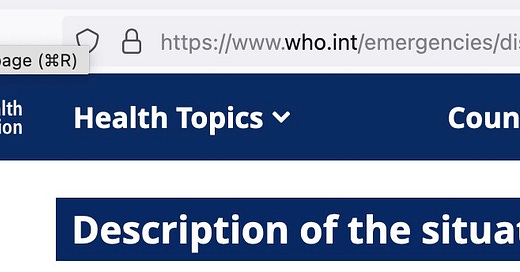



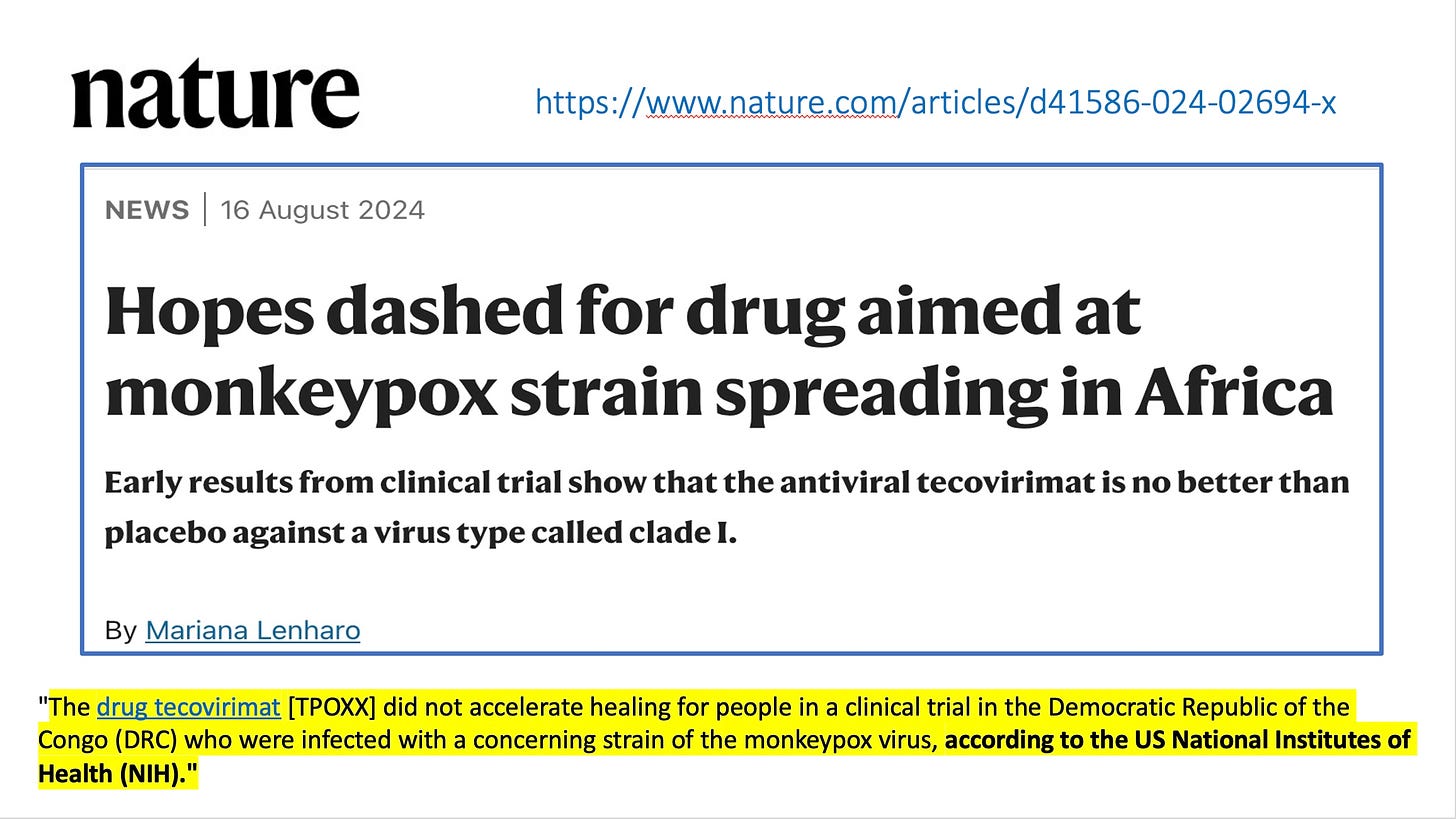
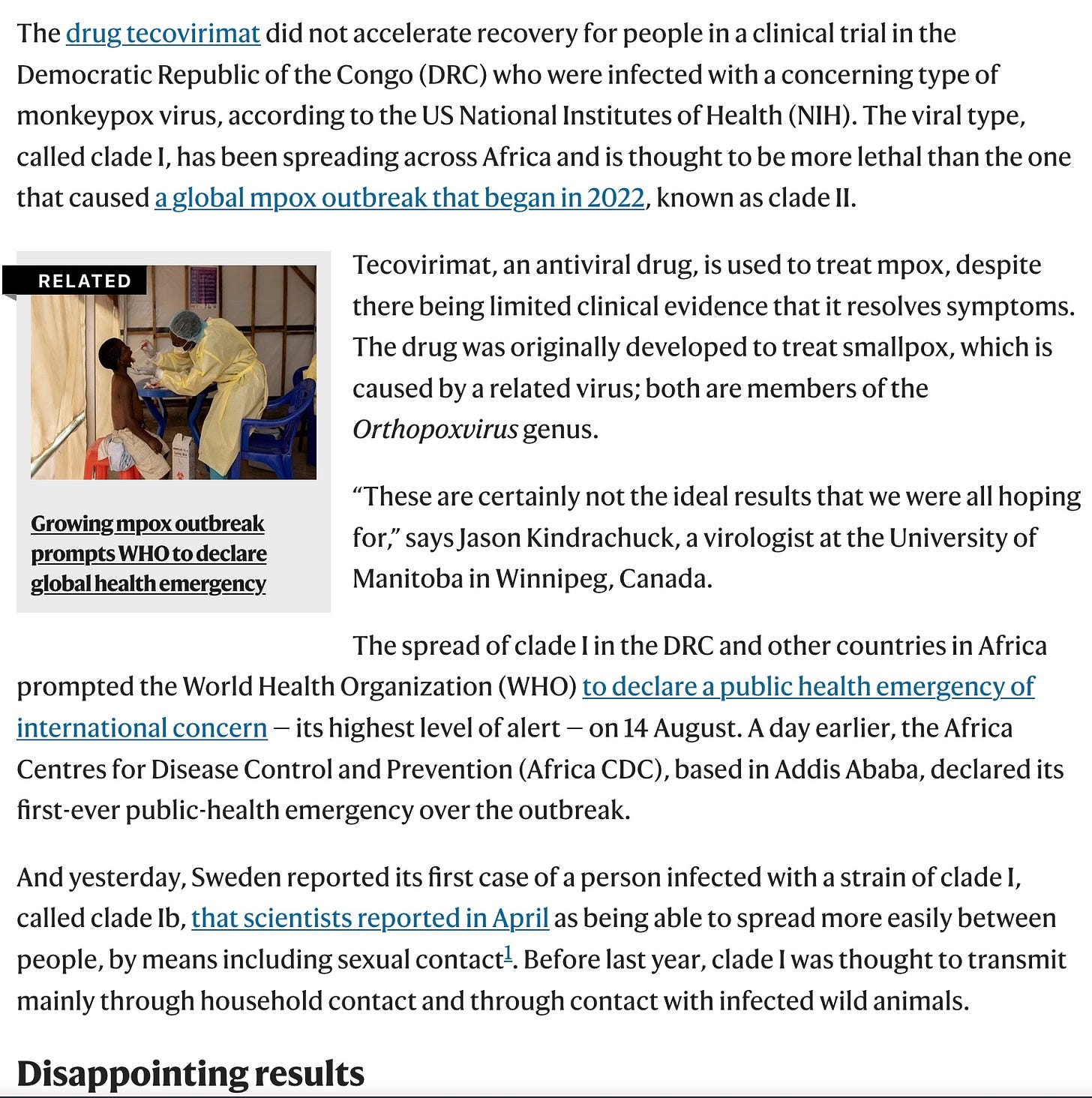
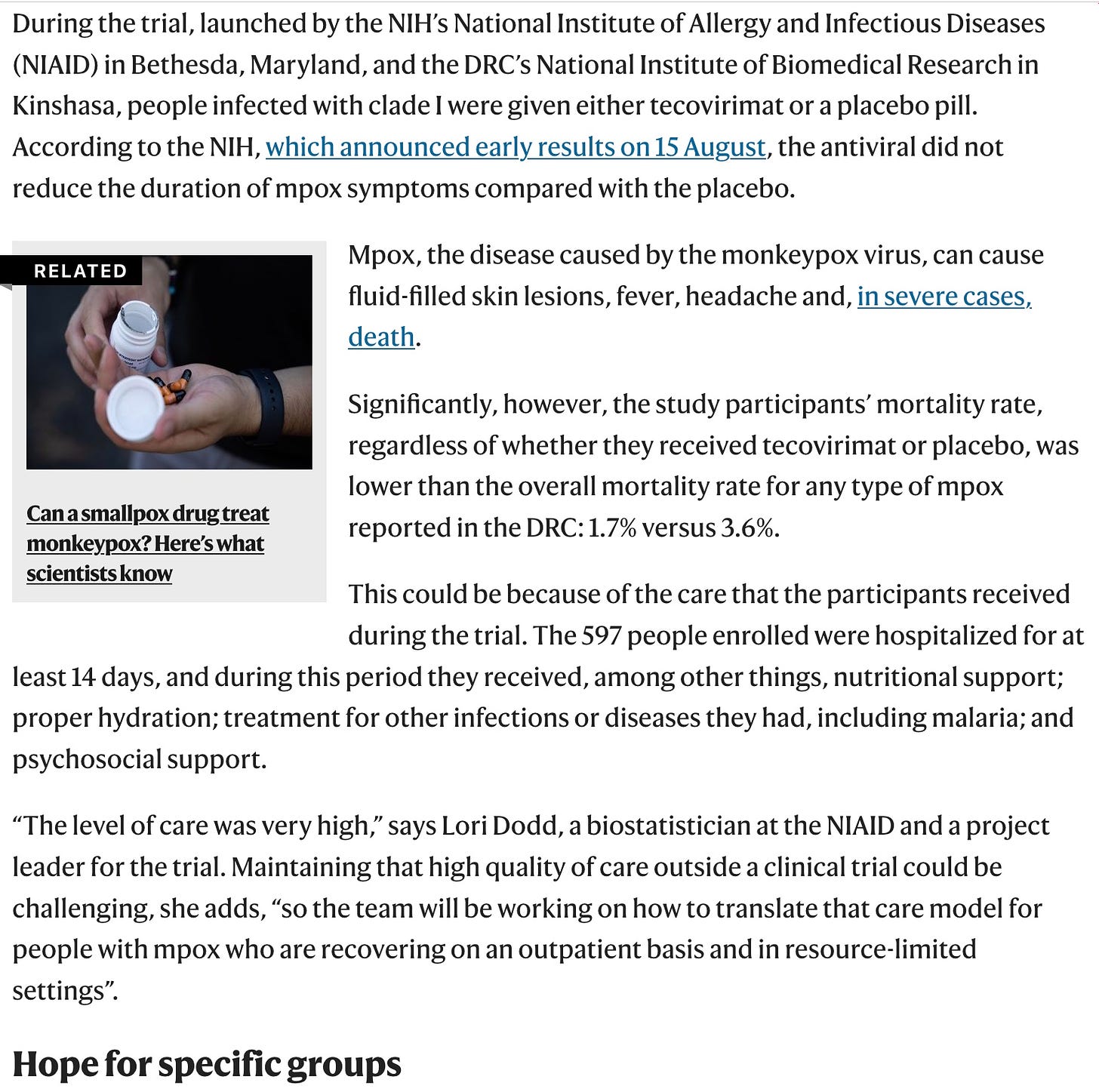
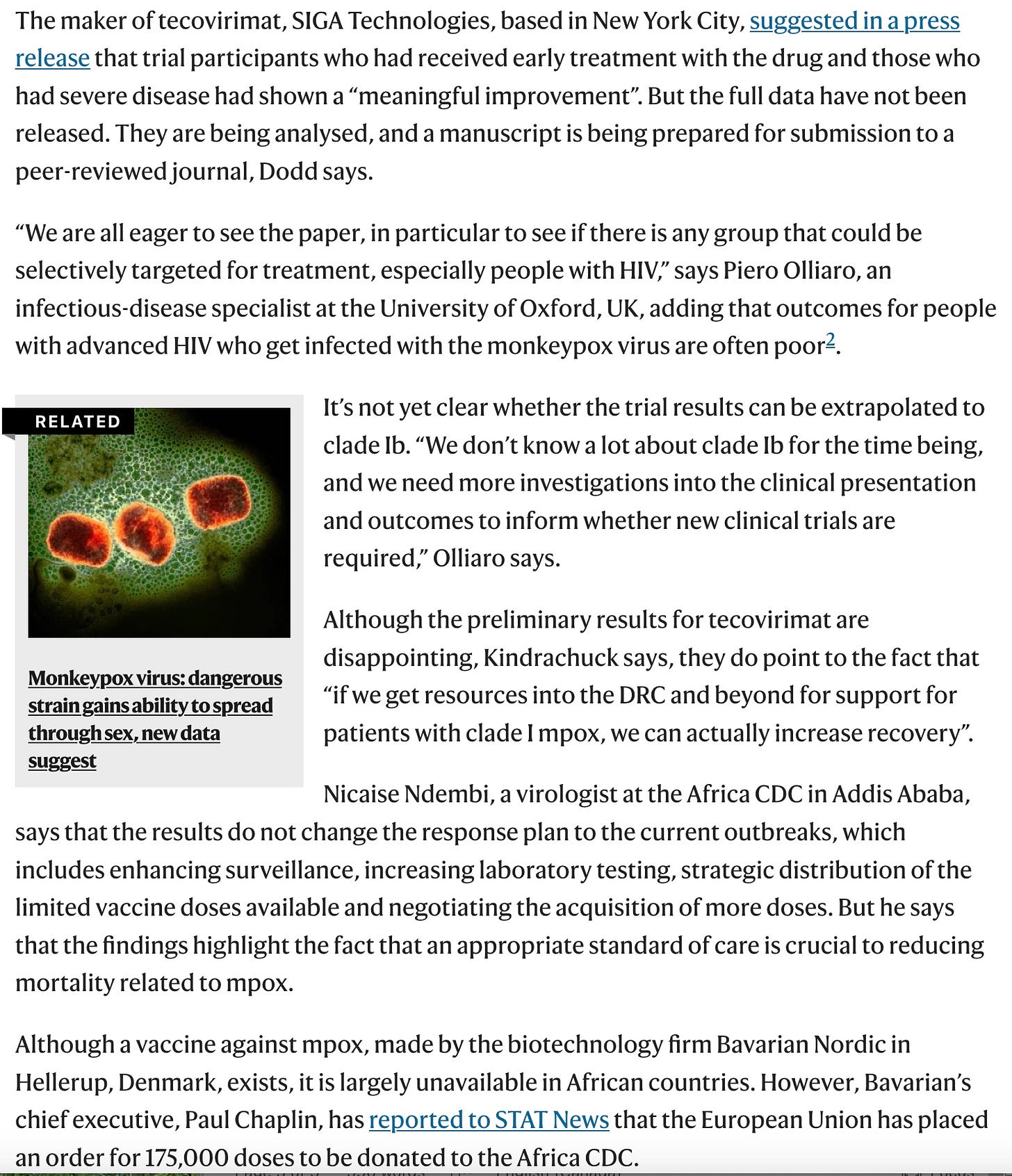
I Just Finished Writing A Book.
It’s Called:
“Vaccines For Dummies”
That’s As Far As I Got.
I Figured I ‘Nailed It With The Title.
My Publisher Agreed.
I Made So Much Money From It That I Am Going To Publish The Sequel For Free:
“Vaccines For Dead People”
I've teamed up with some exclusive brands that have agreed to print some slogans at bargain basement prices to help spread the message that there is no 'virus' causing MonkeyBollox.
“Monkeypox:The only thing missing is the virus!!“ ... Printed on a Dolce and Gibbona T-shirt 🙈
“Monkeypox: The King Kong of Virus Lies!!“ Printed on a Stella Macaque-ny T-shirt 🙊
“Monkeypox virus? WHO went bananas looking!!“ Printed on an Alexander Mcquaw T-shirt 🙉
“Monkeypox: Makes for Gorilla-ping news!! - C himp N ews N etwork - Printed on a Giorgio Arman-drill T-shirt
“Stop Money-pox with Rhesus Pieces!!“ Printed on a Calvin Colobus T-shirt
“Anthony Fauci-mpanzee is Monkeypox!!“ Printed on a Balmain-gabey T-shirt
“Monkeypox Swingers Club“ Printed on a Banana Republc T-shirt
“Monkeypox: Christine Massey asked for evidence - FDA went Ape“ Printed on a Gucci-mp T-shirt
“Monkeypox: CDC swung through all their files and came up with peanuts.“ Printed on a Prada-pe T-shirt